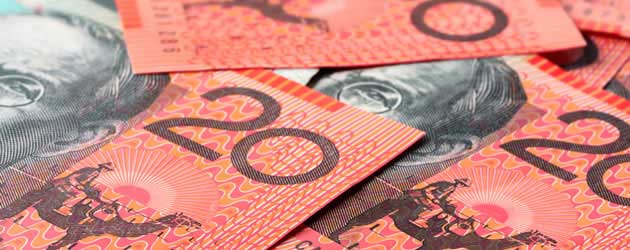
The Pound to Australian Dollar exchange rate (GBP/AUD) jumped higher by over 1.3 cents earlier this morning when it was announced that Australian unemployment unexpectedly rose to a 12-year high in July.
Investors had been primed for the headline unemployment rate to remain at 6.0% but the actual figure came in massively higher at 6.4%.
The hugely disappointing labour market indicator caused investors to push back their predictions for an interest rate hike from the Reserve Bank of Australia.
Earlier on in the week the RBA kept interest rates on hold at the current rate of 2.50% for the twelfth month in a row, stating that policy would likely remain neutral for the foreseeable future due to concerns that the domestic currency is overvalued and therefore acting as an impediment to export growth.
The benchmark interest rate is currently undergoing its longest period of stability since 2006 and this morning’s shocking unemployment figures suggest that the RBA will remain on the sidelines for another twelve months before it begins to tighten monetary policy.
The dire jobs print was exactly what Sterling needed to claw back some respect against the ‘Aussie’ Dollar because during yesterday’s session GBP/AUD tumbled steadily by -1.2 cents.
A softer-than-expected set of manufacturing production and industrial production figures heaped pressure on the UK currency as did an underwhelming GDP estimate from the National Institute of Economic and Social Research (NIESR).
Drowning out calls for 0.6% monthly expansions in manufacturing and industrial production, official figures showed that both sectors only managed to muster half of that: 0.3%.
The soft results were blamed on the strong Sterling exchange rate (the Sterling index measured against a basket of currencies is currently 10% higher on the year), which was seen to make British goods more expensive to foreign buyers.
A separate report during the afternoon showed that NIESR estimate that the British economy only grew by 0.6% in the three months to July, down from 0.8% in the previous quarter.
This potential deceleration of GDP growth weighed on the Pound because it could persuade the Bank of England to wait until next year to start raising interest rates.
Later today the UK central bank is set to announce its benchmark interest rate for August. However, the print is unlikely to yield much market volatility because it is widely predicted that the BoE will leave the current interest rate unchanged at 0.50%.

Comments are closed.